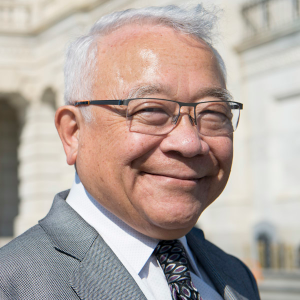Peg Riley has been described as “a fundamentally original thinker who is transforming our understanding of microbial evolution and antibiotic resistance.” This sure-to-be-lively conversation will highlight how uncontrolled spread of resistance has driven us into what CDC and WHO call the “post-antibiotic era”, how a precision medicine strategy can produce microbe-specific therapies or preventatives, and why pharma should be attentive to that approach.
Speaker Profile
Biography
Dr. Yamamoto is a leader in science and public policy. He has made an indelible impact by simultaneously advocating for Precision Medicine across the .edu, .gov, .com and .org sectors. As Chair of the National Academies Board on Life Sciences, he appointed and served on the study committee that produced “Toward Precision Medicine: Building a Knowledge Network for Biomedical Research and a New Taxonomy of Disease”, the report that enunciated the precision medicine concept. He helped to stimulate President Obama’s interest, which led to the Precision Medicine Initiative, as well as Gov. Jerry Brown’s launch of the California Initiative to Advance Precision Medicine. He also promoted a precision medicine approach to Vice President Biden’s Cancer Moonshot, provoked broader participation by the corporate and nonprofit sectors, and directs UCSF Precision Medicine, an institution-wide imperative. In addition, Dr. Yamamoto has led or served on numerous federal or national committees focused on public and science policy, public understanding and support of biological research, research funding and peer review, and science education and the biomedical workforce; he chairs the Coalition for the Life Sciences, and sits on the National Academy of Medicine Council and Executive Committee, and the National Academy of Sciences Division of Earth and Life Studies Advisory Committee. He is a member of the Advisory Board for Lawrence Berkeley National Laboratory and the Board of Directors and Executive Committee of Research!America. At UCSF, Dr. Yamamoto is vice chancellor for science policy and strategy and professor of cellular and molecular pharmacology. He is a leading researcher, investigating transcriptional regulation by nuclear receptors, which mediate the actions of essential hormones and cellular signals; he uses mechanistic and systems approaches to pursue these problems in pure molecules, cells and whole organisms. He is an elected member of the National Academy of Sciences, the National Academy of Medicine, the American Academy of Arts and Sciences, and the American Academy of Microbiology, and a fellow of the American Association for the Advancement of Science.
Speaker Profile
Biography
Margaret (Peg) Riley has championed an alternative to the current paradigm in antibiotic discovery, one that recognizes the power of targeted therapeutic interventions, resulting in lower levels of antibiotic resistance and reduced collateral damage to the microbiome. She provides “proof of principle” for this approach utilizing the diverse family of bacteriocins. These efforts have identified candidates for use in treating TB and UTI’s. Dr. Rliey and her students created a new venture, Organicin Scientific, whose mission is to develop bacteriocin-based biopesticides for use in treating bacterial disease in plants, such as citrus greening and Fire blight. She is committed to engaging the public in science and has appeared with Bill Nye in his TV shows and podcasts and created the Massachusetts Academy of Sciences in 2007. In 1991 she joined the faculty at Yale, where she was honored with the NSF Presidential Young Investigator Award and an NIH FIRST Award. In 2004 she accepted a faculty position at University of Massachusetts Amherst. Peg Riley earned her Bachelor of Arts degree in Biology from University of Massachusetts in 1981, her Ph.D. in population genetics from Harvard University, and she conducted her postdoctoral work at the University of Massachusetts.
Talk
Rethinking The Composition Of A Rational Antibiotic Arsenal In The Age Of The Microbiome
This talk will cover Dr. Riley's research on the development of targeted bacteriocin-based antimicrobials, whose use results in lower levels of antibiotic resistance and limits collateral damage to the microbiome. Her lab is applying these same approaches to develop bacteriocin-based biopesticides, to limit the need for anti-biotic use in food production and thus reduce the exposure of our microbiomes to food-based antibiotics.











